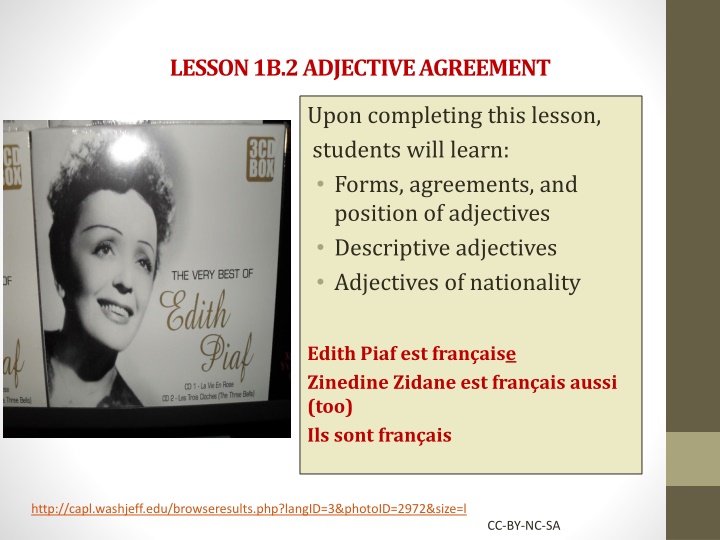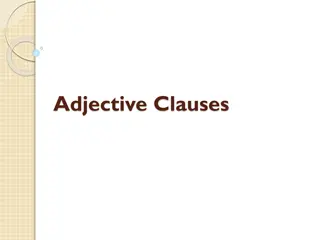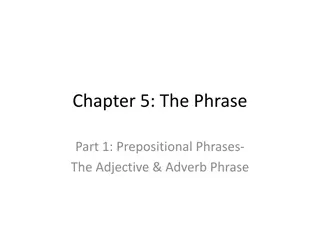
Understanding Adjective Agreement in French
Learn about forms, agreements, and positions of adjectives in French, including descriptive adjectives, cognate adjectives, and adjectives of nationality. Practice exercises and examples provided to enhance understanding.
Download Presentation

Please find below an Image/Link to download the presentation.
The content on the website is provided AS IS for your information and personal use only. It may not be sold, licensed, or shared on other websites without obtaining consent from the author. If you encounter any issues during the download, it is possible that the publisher has removed the file from their server.
You are allowed to download the files provided on this website for personal or commercial use, subject to the condition that they are used lawfully. All files are the property of their respective owners.
The content on the website is provided AS IS for your information and personal use only. It may not be sold, licensed, or shared on other websites without obtaining consent from the author.
E N D
Presentation Transcript
LESSON 1B.2 ADJECTIVE AGREEMENT Upon completing this lesson, students will learn: Forms, agreements, and position of adjectives Descriptive adjectives Adjectives of nationality Edith Piaf est fran aise Zinedine Zidane est fran ais aussi (too) Ils sont fran ais http://capl.washjeff.edu/browseresults.php?langID=3&photoID=2972&size=l CC-BY-NC-SA
Cognate descriptive adjectives -Notice that some adjectives are quite similar (cognates) in French and English. Remember that many words in English come from French and Latin. -The general rule of gender formation for adjectives is to add an e to the masculine form: Claude est charmant/ Ad le est charmante Ils sont charmants/ Elles sont charmantes -For the plural form, you just add and s to the masculine or feminine form.
Lets practice Let s begin with this basic exercise: (answers below) Write in the correct forms of the adjectives. 1. Elles sont___________________(r serv ) 2. Il y a des universit s (f)___________________(important) 3. Christelle est____________________(amusant) 4. Les tudiants sont______________(poli) en cours Answers: 1. Reserv es 2. importantes 3. amusante 4. polis
-You will also notice that some adjectives are the same in the masculine and feminine form: agr able, pessimiste, etc. Usually, they already end in -E George est pessimiste/ Georgine est pessimiste -You may use an adjective with the verb tre or with a noun: Gabrielle est intelligente/ Elle une fille intelligente La classe est difficile/ C est une classe difficile (It s a .) -As you can see, adjectives are placed after the noun or after the verb tre
Adjectives of nationality Remember: Where are you from? D o es-tu? (informal) *De+o = d o D o tes-vous (formal) (literally: From where are you?) I m from Je suis de Boston/ Elle est de Paris Je suis du Br sil (masculine: de+le=du) Je suis de la Chine (feminine) Je suis de l Italie /Je suis de l Argentine Yes, countries can also be masculine and feminine. There is not an absolute rule, however it may be helpful to know that European countries are usually feminine and American, African and Asian countries (except China) are usually masculine. Je suis des tats-Unis *des= de+les (plural)
More about nationalities You can also answers the question D o es-tu? with an adjective of nationality: answer: Je suis am ricain/e However, the question that elicits directly an adjective of nationality is: De quelle nationalit es-tu?/ De quelle nationalit tes-vous? (=Of which nationality are you?)
More about nationalities Notice the following exceptions and differences: -adjectives ending in -EN: femenin=+NE. Ex. italien/italienne -but not with adjectives ending -ain americain=americaine/ mexicain=mexicaine) -The adjective suisse remains the same, masculine or femenine: Il/elle est suisse but Ils/elles sont suisses Did I mention that adjectives of nationality are not capitalized?
Practice Write sentences according to the model. (answers in next page) Carole/France: Carole est fran aise 1. Bob et Jim/les tats-Unis______________________________________ 2. Amani et Ahmed/ le S n gal___________________________________ 3. Trevor/ l Angleterre (England)__________________________________ 4. Francine/ le Qu bec____________________________________________ 5. Monika/ l Allemagne (Germany)_________________________________ 6. Maria-Luisa/ l Italie___________________________________________ 7. Fran ois et Jean-Philippe/la Suisse_________________________________ 8. Gabriela/le M xique____________________________________________ 9. Yoko et Keiko/le Japon___________________________________________ 10. Paul/le Canada________________________________________________
Answers 1.Bob et Jim sont am ricains 2. Amani et Ahmed sont s n galais 3. Trevor est anglais 4. Francine est qu becoise 5. Monika est allemande 6. Maria-Luisa est italienne 7. Francois et Jean-Philippe sont suisses 8. Gabriela est m xicaine 9. Yoko et Keiko sont japonaises 10. Paul est canadien By the way: De quelle nationalit est-tu? Roger Celis






















